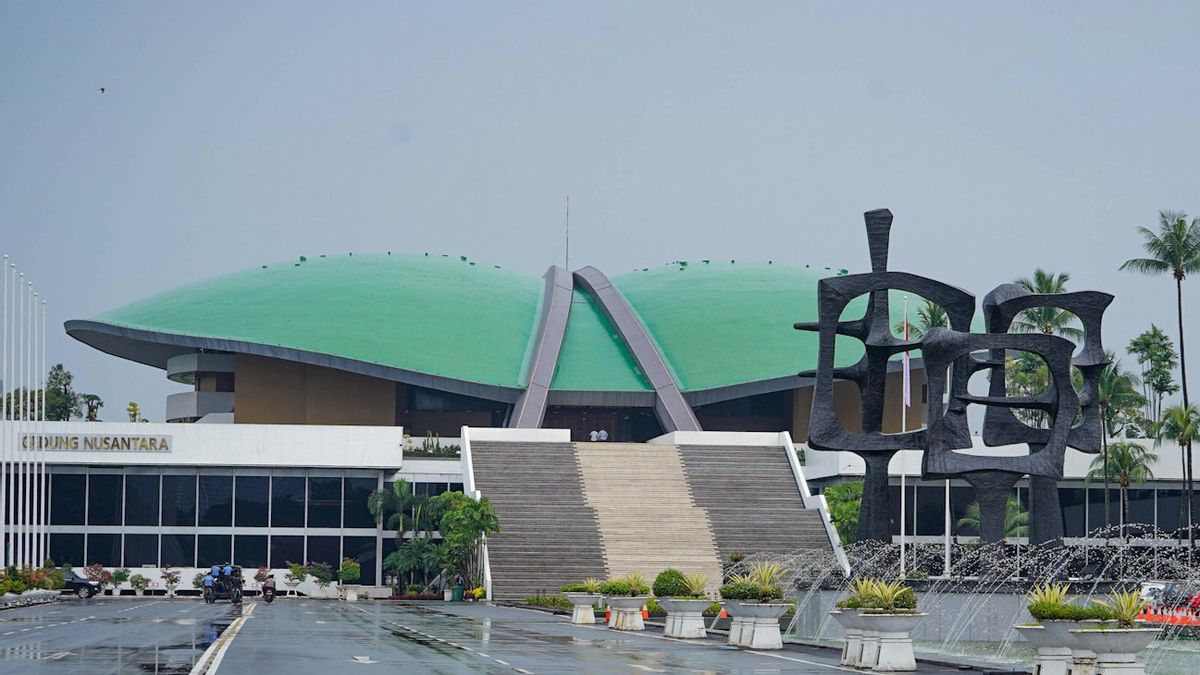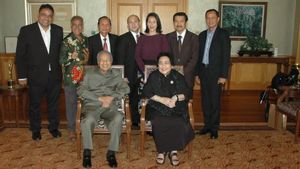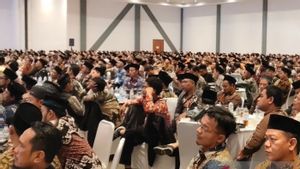Member of the Legislation Body (Baleg) of the DPR RI Arzeti Bilbina encourages the Draft Law (RUU) for the Indigenous Law Community to be ratified immediately. He considered that the bill was important to ensure the rights of indigenous peoples who had been neglected and guaranteed the preservation of Indonesian cultural traditions.
"Certaining the rights of indigenous peoples is an obligation of the State. So we encourage the Bill on Indigenous Laws to be included in the priority Proglenas so that it can be ratified immediately," said Arzeti, Monday, November 18.
The Indigenous Law Community Bill itself has been proposed since 2003 and its academic paper was formulated in 2010. Although it has long been included in the DPR Prolegnas, the bill concerning the benefit of the people has not yet been ratified.
Various institutions, including non-governmental organizations and indigenous communities, actively advocate for the recognition of the rights of indigenous peoples, as well as the protection of their culture and environment. With the spirit of the new DPR period, Arzeti hopes that the Indigenous Peoples Bill will get more attention.
"Because this concerns official recognition of customary laws such as culture and language so as not to be eroded by the times," said the member of the PKB faction.
Indigenous peoples with all their traditions and local wisdom have become an integral part of the history and identity of the nation. Unfortunately, so far their rights have often been neglected and their legal recognition of their existence is still minimal.
SEE ALSO:
Arzeti assessed that the MHA Bill must be ratified immediately in order to provide official recognition of customary law and the rights of indigenous peoples. As the initial goal of this bill is to provide legal recognition of the rights of indigenous peoples, such as land rights, natural resources, and the right to maintain their culture.
"With the special regulation regarding indigenous peoples, we hope that the Government will pay more attention to cultural customs in Indonesia. Moreover, nowadays it has been attacked by massive foreign cultures," said Arzeti.
Through the MHA Bill, countries can also provide cultural protection and traditional traditions that have been inherited since the time of their ancestors. To note, the MHA Bill also regulates the recognition of languages, arts, and traditional practices that are the hallmarks of every traditional group.
According to Arzeti, the MHA Bill can improve the welfare of indigenous peoples and encourage more inclusive and sustainable development.
"It can also provide long-term interests for the community and the government can maintain the cultural customs of our society," explained the legislator from the East Java I electoral district.
Arzeti is worried that the lack of protection for indigenous peoples will bring Indonesia into a nation with a cultural identity crisis.
The Association of Indigenous Peoples will ensure that our original culture is maintained. Many of our cultural customs have begun to disappear because of the current progress of the times, such as our regional language which has started to be unused and is not used by local people," explained Arzeti.
Arzeti said that the progress of the times had a positive impact but if it was not managed properly, it would obscure the identity of the Indonesian nation which has cultural wealth.
"Especially for our young generation who currently use English as their mother tongue and some even have difficulty in Indonesian. On the one hand, they have good skills in foreign languages so that they are not less competitive in the midst of globalization, but young Indonesians must still be reminded of the roots of noble culture that we have," he said.
Launching the publication data of the 2020 Population Census (SP) Long Form conducted by the Central Statistics Agency (BPS), the use of regional languages to neighbors and relatives is decreasing in the younger generation.
BPS uses William H. Frey's classification to determine the level of use in each generation. In the data, it can be seen that the post-gen z generation or individuals born in 2013 and above, only 61.7% use regional languages. Meanwhile, for Gen z who was born in 1997-2012, only 69.9% used their regional language.
Despite the art of regional music and culture that has followed the times of today's young generation, Arzeti assesses that intervention is needed to preserve Indonesia's cultural wealth.
"Moreover, digital accessibility is getting higher which can easily affect the mindset of our young generation, including the inclusion of foreign cultures," said Arzeti.
Arzeti also gave an example of how South Korea managed to ground their culture in various parts of the world such as success in K-Pop and K-Drama which cannot be separated from the support of its own government.
"By making cultural conservation a priority, South Korea has succeeded in bringing Korean culture to the world. We will see how successful K-Pop and K-Drama are in the South Korean economy," he said.
Indonesia must be like that so that our language and culture are known in the global arena. How proud we are that Indonesian native music such as Gembang Krimong, Karawitan, Gamelan, Kombi from Papua, Kolintang, Gambus and others can be like K-Pop, "added Arzeti.
The woman who is also on duty at Commission IX of the DPR also highlighted how indigenous peoples are often eroded by industrial interests. With a special regulation, Arzeti assessed that indigenous peoples can have legal certainty in managing resources in their homes.
"If the MHA Bill is passed, indigenous peoples will be made easier in utilizing natural resources in their regions. So that the economy will also get better," he explained.
Arzeti also reminded how indigenous peoples are often expelled from their own land. Usually due to land acquisition by corporations, both facilitated by the state and illegal ones.
Many indigenous peoples often face the law, they fight against large groups who try to control the forests they live in. This is because indigenous peoples do not have legal protection," said Arzeti.
"So the MHA Bill has become a necessity to be ratified if we want to protect indigenous peoples so that they will have legal protection from the government and companies that have the potential to be detrimental to economic interests," he continued.
The English, Chinese, Japanese, Arabic, and French versions are automatically generated by the AI. So there may still be inaccuracies in translating, please always see Indonesian as our main language. (system supported by DigitalSiber.id)

















